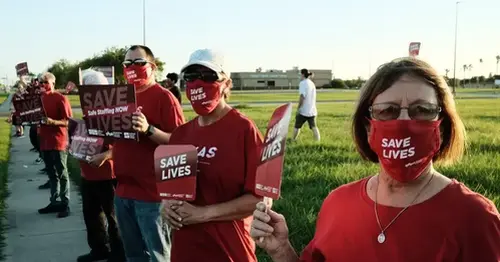
Some workers at U.S. hospital giant HCA say it puts profits above patient care
Nancy Jaquins was following doctor’s orders last July when she drove her partner to the emergency department at Mission Hospital in Asheville, North Carolina.
His hemoglobin level had crashed, she said, and his doctor, affiliated with the HCA-owned hospital, said he needed to get there as soon as possible for a blood transfusion. A heart condition made his situation urgent.
Once inside the Mission emergency department, however, they found it crowded and understaffed, with people sleeping or sitting on the floor, said Jaquins, a former psychiatric and cardiac nurse. The couple was told to “take a seat,” she said.
For more on this story, tune in to NBC Nightly News with Lester Holt tonight at 6:30 p.m. ET/5:30 p.m. CT or check your local listings.
Fourteen hours later her partner finally got a bed, Jaquins said; another five hours went by before the hospital found him a room. Once there, he received five units of blood, she added, staying in the hospital for four days.
Although her partner ended up OK, the long delay in treatment was “abhorrent and unconscionable,” Jaquins said.
“Mission Hospital used to be where everyone would go if they wanted good care,” Jaquins said, reflecting on her previous experiences with the health care system. But that dynamic changed in 2019, she added, when HCA Healthcare, the nation’s largest for-profit hospital chain, bought Mission Health System’s six hospitals in western North Carolina.
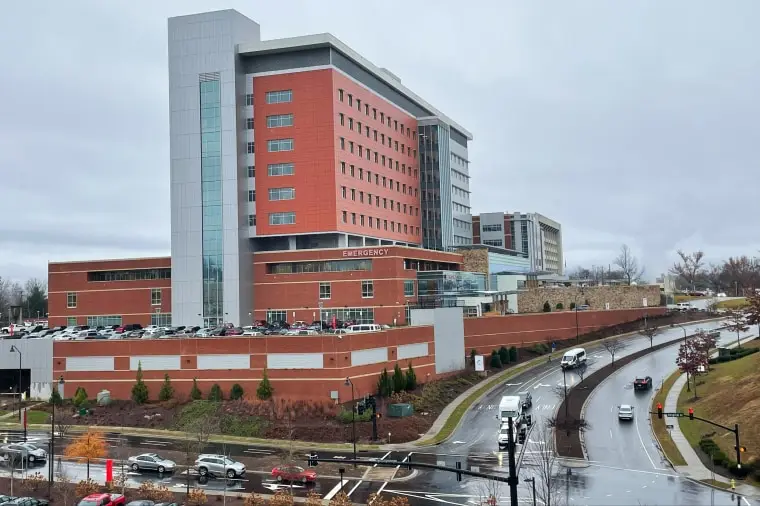
Because Jaquins’ partner did not want to identify himself, a Mission spokeswoman said in an email that she could not check the specifics of the patient’s experience. She noted, however, that “there are several reasons which lead us to believe that this particular story does not portray an accurate picture,” she said. For example, she added, “receiving 5 units would be exceptionally unusual” in such a case.
HCA is a health care juggernaut, employing 284,000 people in 182 hospitals and 125 surgery centers across the country and in the U.K. Operating in 20 U.S. states, HCA generated almost $7 billion in earnings in 2021, double that of the prior year, securities filings show. In the first nine months of last year, it earned $4.2 billion.
Investors are pleased with this performance — HCA’s shares were down only 6.6% in 2022 versus the 19.4% decline of the Standard & Poor’s 500 stock index.
But some HCA workers are concerned the company’s profit focus is imperiling patient safety and care. Health care providers throughout the U.S. are experiencing hiring challenges. Still, 11 current and six former HCA employees in five states told NBC News they believe the company understaffs its hospitals as a practice, helping to keep earnings high but increasing the risks of adverse patient outcomes.
Buttressing this view is a new study of HCA’s staffing by a union representing some of its employees. It found the company’s overall staffing levels recently were below the average for other hospitals in 19 of the 20 states where it provided care.
Sue Fischer is a longtime HCA employee who’s concerned about patient care in her facility. A 17-year registered nurse in a cardiology unit at the hospital that treated Jaquins’ partner, Fischer has worked at Mission both before and after the HCA buyout. Not long after the takeover, she told NBC News, patient-to-staff ratios rose and ancillary staff disappeared. As the burden on nurses increased, often requiring them to do the non-nursing work of those whose jobs were cut, patient care suffered, Fischer said.
Eleven other current and former Mission employees echoed Fischer’s views.
Jodie Becker is vice president for quality at HCA’s North Carolina Division, which includes Mission Health. A registered nurse, she has worked at Mission since 2012 and disputed criticism of its care and staffing.
“We were a great system as Mission Health and we’re an even better system as HCA Mission Health,” she said. “When there are concerns, we look at those very seriously, we treat each one individually and make sure that we put processes in place that will protect our patients and our team. We treat over 2 million people a year, we get cards and letters and phone calls every day talking about the outstanding work that our caregivers give.”
HCA’s corporate spokesman, Harlow Sumerford, said it is the company’s goal to provide its 35 million patients with high-quality care they want and deserve. Sumerford said that more than 4 out of 5 HCA hospitals rated by Leapfrog, a national patient safety organization, received an A or B grade, adding, “We are not satisfied and we are continuously looking for ways to improve.” HCA supports its caregivers “through investments in cutting-edge technology and automation, expanded training and education programs, and research designed to drive better outcomes for our patients,” he said.
Sumerford declined to comment on various criticisms raised by HCA employees, including that the company cuts ancillary staff and requires nurses to pick up the slack.
He did note that HCA gives back to its communities. In 2021, the company provided charity care, uninsured discounts and other uncompensated care totaling approximately $3.3 billion. Because HCA Healthcare is a for-profit, tax-paying company, it is not required to provide charity care as nonprofit hospitals are.
Still, the company’s securities filings acknowledge that in 2021, HCA didn’t come close to meeting its own internal patient care benchmark — what the company calls the “Care Experience.” The measure is based on how HCA’s inpatients and patients in its emergency departments rate their interactions with the company.
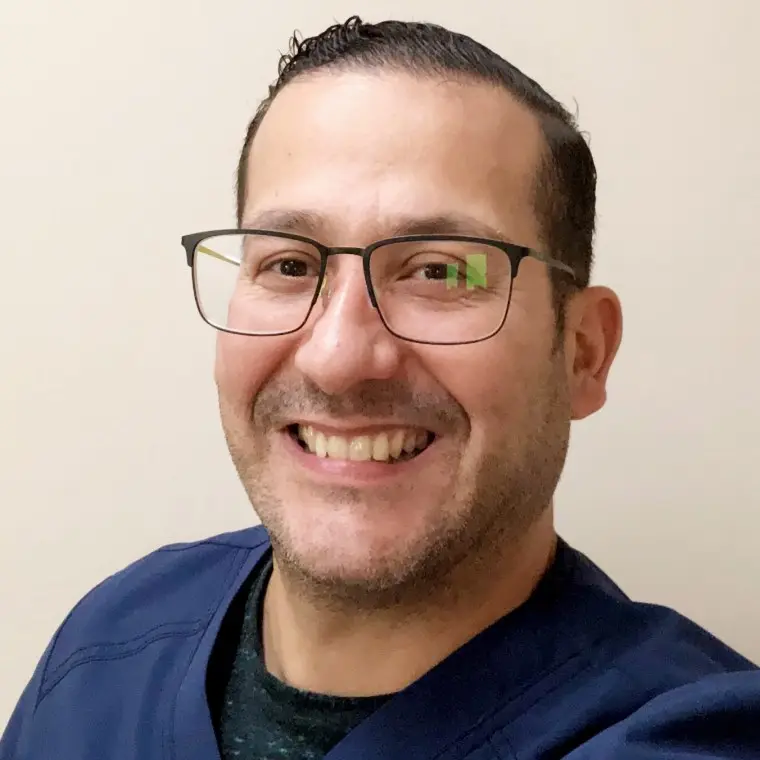
Because the company fell short of the “Care Experience” benchmark, HCA Chief Executive Samuel N. Hazen received zero performance pay related to the metric in 2021, company filings show. Hazen still received $20.6 million in compensation for the year.
Rublas Ruiz is a 10-year veteran at HCA Florida Kendall in Miami and works as a nurse in the intensive care unit. Ruiz said his workplace is so understaffed that he and other nurses have to leave the ICU to deliver patients to other areas of the hospital for CT scans or MRIs, a job usually performed by patient transporters.
“This is a major patient safety issue,” he told NBC News. “When we play this role, the rest of the nurses in the unit are left with even more responsibility because there are less nurses watching the patients.”
'A very efficient level'
As at any hospital, staffing is a big expense for HCA — salaries and benefits accounted for 46% of the company’s revenues in the first nine months of 2022, its securities filings show.
Efficiencies in staff can translate to higher earnings at a facility but inadequate staffing can result in inferior patient outcomes, academic research shows, including higher mortality rates.
HCA management highlights its staffing effectiveness. “Our productivity is at a very efficient level when it comes to employees per patient,” CEO Hazen told Wall Street analysts last April on an earnings call.
But this efficiency may be contributing to patient care problems, according to an in-depth study of HCA’s staffing practices commissioned by the Service Employees International Union, which represents some HCA employees. After examining Medicare cost report data, hospital inspection reports and lawsuits, the SEIU researchers found what they called “strong evidence of staffing-related quality breakdowns in HCA hospitals.”
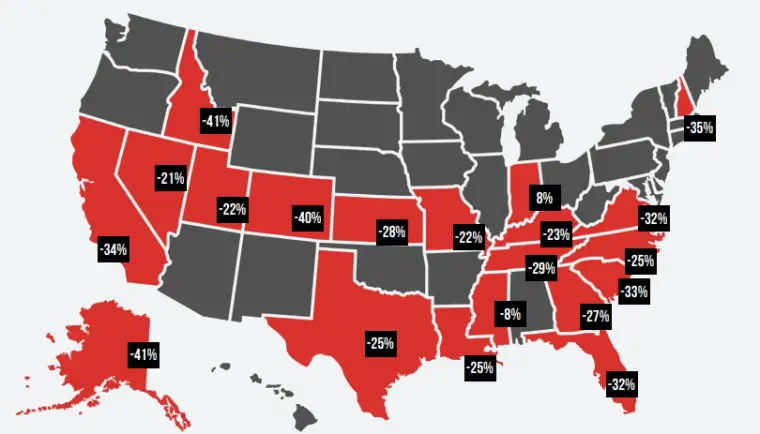
By 2020, HCA staffed its hospitals about 30% below the national average, the analysis found. In 19 of the 20 states in which it operated hospitals, HCA staffing ratios were 8% to 41% lower than the average for all other hospitals, the report says. “Medicare cost report data shows staffing levels routinely and precipitously drop after HCA acquires a hospital,” the report added. It cited examples of patient harm linked to low staff levels, such as missed nursing assessments, delays in patient treatment and patient falls.
While some hospitals cut staff to stay solvent, the report noted, HCA’s profits mean it could afford to invest in workers rather than buying back its own stock, for example. HCA repurchased $5.45 billion in stock in the first nine months of 2022, its securities filings show.
“This incredibly powerful corporation can afford to provide front-line workers with the resources they need to provide the care that patients deserve,” said Mary Kay Henry, SEIU’s international president.
Sumerford, HCA’s spokesman, accused the union of “having cherry-picked data and anecdotes that seem to support their accusations and ignoring the data and anecdotes that do not. The reality is, against the backdrop of a national nursing shortage exacerbated by a pandemic and continuing patient surges, HCA Healthcare’s staffing is safe, appropriate, in line with other community hospitals, and in compliance with applicable regulations.”
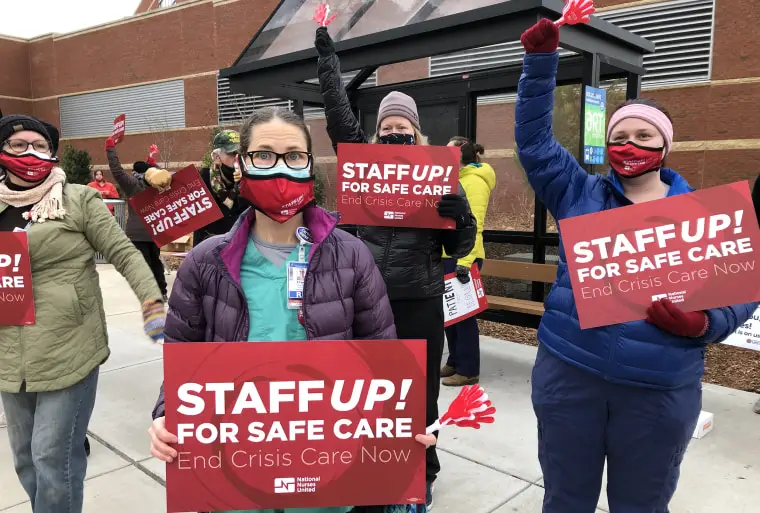
The company makes large investments in its people, he added. “In the past year, we invested almost half a billion dollars in additional compensation for our frontline caregivers and support staff,” he said in the statement, “doubled down on our efforts to hire more nurses and other caregivers, and opened five nursing schools whose graduates can work anywhere.”
All of the current and former HCA employees interviewed by NBC News — 12 at Mission and five at other facilities — said they consider the company’s staffing inadequate. Twelve of the workers are represented by unions — either National Nurses United or SEIU.
For the past 18 years, Jody Domineck has worked at HCA, most recently as a pediatric nurse at Sunrise Hospital and Medical Center in Las Vegas, a facility owned by HCA.
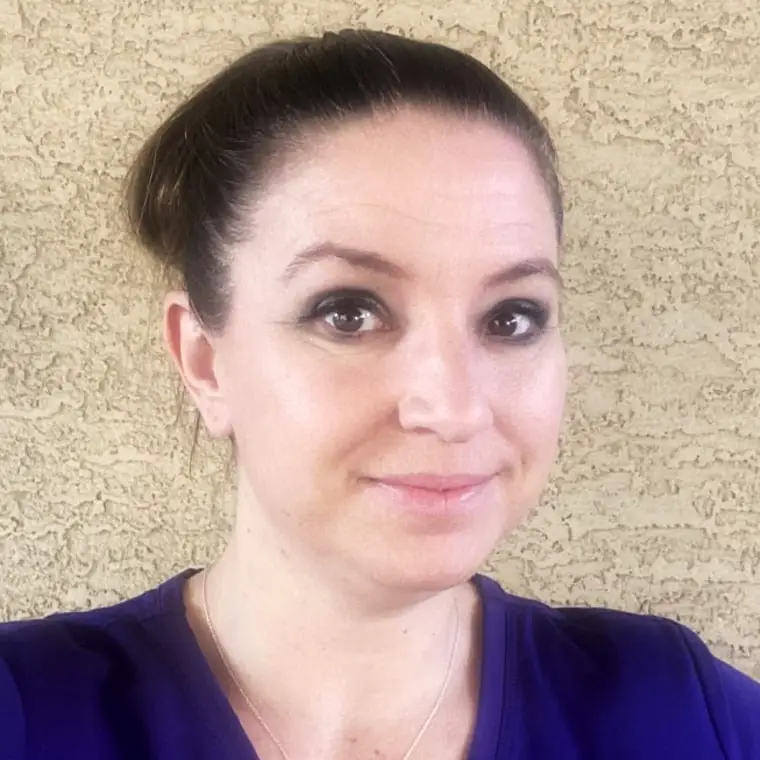
Domineck says she loves what she does and the young people she serves. But her increased patient loads make her worried for their safety, she said. “When I go from four patients to six patients, every patient gets less time, less explanation, less education,” Domineck said. “That makes it more dangerous for all of them.”
A few years ago, Domineck was expecting a child of her own and made an interesting choice: to deliver at a nearby hospital that’s not owned by HCA. A lower patient-to-staff ratio at the rival hospital was the determining factor, Domineck said.
“My daughter was one of two babies per nurse in the neonatal intensive care unit,” she told NBC News, “not five like at the HCA hospital.”
'Waiting days for an MRI'
As the nation’s largest hospital company, HCA has been hit hard by the ongoing shortage of health care professionals, especially nurses. Research published in Health Affairs last April, showed that 100,000 nurses left the profession in 2021, the first decline in four decades.
A study by the American Association of Colleges of Nursing cited three main reasons for the shortage: Not enough nursing school faculty to keep up with program enrollments, a significant portion of the workforce nearing retirement age and insufficient staffing at health care facilities that’s “driving many nurses to leave the profession.”
The HCA spokesman characterized this situation as especially challenging for hospitals and caregivers. “Last year HCA Healthcare added more than 4,000 support positions, Licensed Practical Nurses/Patient Care Technicians, to assist our Registered Nurses and allow them to practice at the top of their licenses,” Sumerford said in the statement.
The current and former HCA employees told NBC News that the company’s lean staffing practices make it tougher to hire and keep health care workers. When staffing levels are low, nurses said they fear they won’t be able to care adequately for patients and could lose their licenses if an adverse event took place. This makes potential workers less likely to stay on at an understaffed facility.
Michelle Harvey is a surgical technologist at an HCA hospital in El Paso, Texas, who works 12-hour shifts assisting ER doctors with so-called night trauma cases. She told NBC News she is seeing new nurses at her facility, who received sign-on bonuses to join, leave before their contract periods were up.
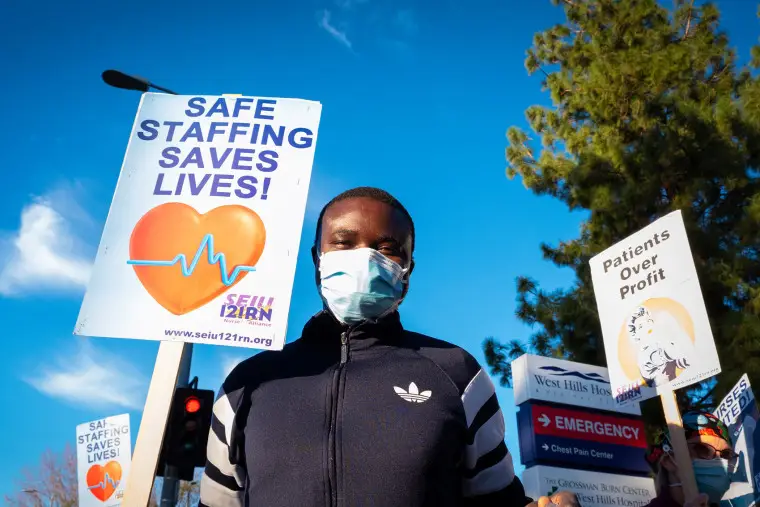
“They don’t even finish the contract term,” Harvey said. “They have to give back a portion of the bonus, but they don’t want to put their licenses on the line.”
To combat the threats that lean staffing can pose to patients, some states require hospitals to maintain minimum worker-to-patient ratios. For example, California requires hospitals to maintain specified staff-to-patient ratios and Massachusetts has a law stating that intensive care units must keep staff at certain levels.
HCA’s financial filings note that its revenues would be hurt if other states in which it operates implemented mandatory staffing ratios. NBC News asked HCA to provide average staffing ratios both at Mission Hospital and across its facilities nationwide; it declined.

In 2021, NBC Bay Area reported that CMS had produced a 65-page analysis on failures at HCA’s Good Samaritan Hospital in San Jose, California. Among the report’s findings: The hospital’s nurse-to-patient staffing ratios did not comply with state requirements.
HCA’s spokesman declined to comment on that report. At the time, the hospital’s spokesperson told NBC Bay Area: "We addressed every issue noted by CMS and we are ensuring Good Samaritan is in full compliance."
Monique Hernandez has been a nurse for 13 years at Riverside Community Hospital, an HCA-owned facility in Riverside, California. She told NBC News that her facility is often “out of ratio,” meaning that mandated levels aren’t met.
“Delays in care is the biggest patient care issue I see because of staffing,” Hernandez said. “You have people waiting two days for an echocardiogram, patients waiting days for an MRI or CT scan.”
'Constantly putting profits over patients'
In North Carolina, HCA is under rising scrutiny. Last year, an antitrust lawsuit filed in state court against HCA and Mission was allowed to proceed; it accused the system of cutting staff and monopolistic conduct that left “Western North Carolinians with increasingly bad health care at an ever-growing price.”
Medicare cost data from 2018 through 2021 show that the number of full-time employees at Mission Hospital has declined by 37% since HCA took the system. Mission’s spokeswoman said that drop counted employees in administrative positions that still work at Mission but are now counted as HCA employees given the takeover.
But the positions the spokeswoman said had been transferred to corporate headquarters — information technology, human resources, marketing and finance — would likely total less than 5% of its full-time employees, according to average hospital employment figures published by the Bureau of Labor Statistics. Even if all the hospital’s “office and administrative support” jobs had been shifted as well to HCA headquarters, the combined total would likely account for a decline of just 7%, the BLS figures suggest.
HCA’s spokesman noted that since fall 2021, Mission Hospital has received an "A" safety grade from Leapfrog. It also received Magnet status, a nursing certification received by 9.9% of hospitals in the United States.
According to the CMS ranking system, Mission Hospital currently holds an above-average overall quality rating — four stars out of a possible five. But its CMS patient survey rating, compiled from recently discharged patients, is two stars.
On the 10 key questions in the patient survey, Mission ranked below both national and state averages, the CMS website shows; for example, only 47% of Mission patients reported that they had “always received help when they wanted” at the hospital. This compares with the national average of 66% and the state average of 63%.

Dale Folwell, North Carolina’s state treasurer, oversees the state employees’ health insurance program and pays its bills, totaling $3.5 billion a year. He said since the HCA takeover, he has watched costs at Mission Health rise significantly while care has declined, a constant refrain he hears from his constituents. On costs, Folwell’s analysts concluded that Mission Health charged privately insured patients more than 300% of Medicare, on average.
“I think that HCA is constantly putting profits over patients,” Folwell told NBC News. “This has been a disaster for the people of western North Carolina.”
Becker, who oversees quality at Mission Health, said Folwell’s views were “absolutely not true,” adding, “That’s not been my experience over the last several years.”






